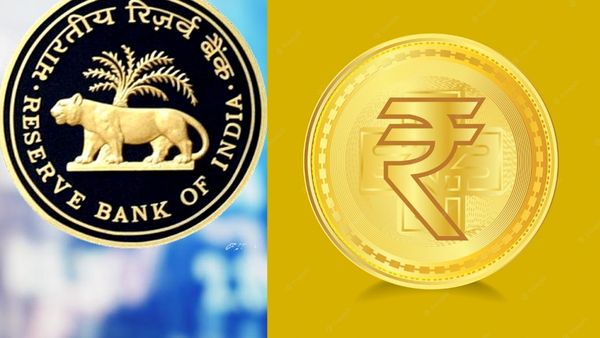Indian Digital Currency: India’s plans for a digital rupee
Digital rupee: This digital rupee can be exchanged for cash, equivalent to the banknotes that central banks like the RBI issue in paper form. The RBI will continue to issue the CBDC, which will serve the same function as banknotes but is not a decentralised asset like cryptocurrencies.

Indian Digital Currency- On Tuesday, November 1, the Reserve Bank of India (RBI) introduced India’s first digital rupee pilot scheme for the wholesale market. The Reserve Bank of India’s central bank, the Digital Rupee (e), often referred to as Central Bank Digital Currency (CBDC), issues currency notes in digital form. Although it is essentially the same as banknotes, using digital money is probably simpler, quicker, and less expensive. Furthermore, it offers every transactional advantage of other digital payment methods.
What do we currently know about the e-rupee?
Two versions of the e-rupee will be distributed: wholesale for use in interbank settlements and retail for general circulation. Commercial banks have the ability to distribute digital money even though the RBI issues it.
The RBI letter stated that it must be kept in an e-wallet offered by a bank or other authorized service provider.
The RBI’s Central Bank Digital Currency (CBDC) would be issued and managed by the central bank itself, in contrast to cryptocurrencies, which are private in nature.
Key Points–
- A new digital currency, the e-rupee, has been conceptualised by the Reserve Bank of India (RBI) in two forms: wholesale for interbank transactions and retail for the general public.
- In contrast to cryptocurrencies, which are private in nature, the RBI’s Central Bank Digital Currency (CBDC) would be created and managed by the central bank itself.
- The central bank is concerned about the effects of large withdrawals on India’s banking and financial system, thus it is doubtful that the e-rupee would accrue interest.
What is Digital rupee?
Digital currency is essentially payment systems that incorporate digital transactions in electronic form and is not physically solid like the rupee, according to Rachit Chawla, CEO of Finway FSC. Starting on November 1st, the Reserve Bank of India (RBI) will begin testing the digital rupee.”
“The RBI’s proposed digital rupee would be created using a cutting-edge payment system that is inexpensive, accessible, practical, effective, secure, and safe and intends to support the digital economy even more. It should be highlighted, nonetheless, that the idea behind starting a digital currency is simply to supplement, not to replace, the current forms of financial transaction.
While the current payment system is still in place, it will offer users an extra payment option. Therefore, it is safe to say that the use of digital currency will have no impact on that of traditional currencies,” he continued.
To issue virtual money for transactions involving government assets, the digital rupee (e) will be utilized. The currency will exist only digitally, exactly like other cryptocurrencies, however, the Reserve Bank of India will govern it, so it won’t be decentralized (RBI).
The Indian government will embrace and fully legalize the digital rupee. Two stages make up the launch process. The digital rupee has been introduced for wholesale transactions, or for big transactions, for the first time during this test period.
How will e-rupee work?
Through a token-based system, e-rupees will be distributed to the entire population. The recipient’s public key must be known by the person transferring the digital money (a sort of digital address). The recipient’s private key (a special password) and the public key are both used to complete the transfer.
The RBI concept note said that “…unique tokens based on approved methodologies would need to be manufactured, which may be relatively resource-intensive.”
Transactions are likely to be somewhat anonymous; those involving larger sums may be required to be reported, whilst those involving lesser sums may be completely anonymous, exactly like with cash transactions.
The RBI opposes the e-rupee receiving interest. It contends that customers might withdraw money from banks and convert it to digital form if the e-rupee accrues interest, which would have an impact on India’s financial and banking systems.
How digital rupee is different from cryptocurrency?
PayMe’s CEO and founder, Mahesh Shukla, said: “Since the digital rupee is neither a physical good or a virtual asset, unlike cryptocurrencies, there can be no direct comparison between the CBDC (Central Bank Digital Currency) and them. Furthermore, cryptocurrency is not quite money.”
Similar to the paper banknotes which central banks like the RBI produce, this digital rupee may be converted into cash. The CBDC, which will perform the same role as banknotes but isn’t a decentralized asset such as cryptocurrencies, will continue to be issued by the RBI.
What makes the two different from one another?
Finway FSC’s Rachit Chawla said, “Cryptocurrency and digital currency both use online transactional methods, but there are a few minor differences between the two.
Cryptocurrencies are a different type of payment with their own set of algorithms, whereas Central Bank Digital Currency (CBDC) relates to the digital form of a nation’s fiat economy.
Cryptocurrencies are digital currencies in a decentralized network that might be referred to as the nation’s digital fiat.
On the other hand, unlike cryptocurrencies, whose value is fully independent of central banking authorities as well as follows a transparent process from mining to ownership to conversation of assets, digital currencies are entirely controlled by the central bank. And the government set the value of the currency.”
Objective of launching Digital Rupee?
India’s advancement in the battle for virtual currencies is the main goal of the Reserve Bank of India’s (RBI) pilot project on digital money. This is also due to the rising popularity of cryptocurrencies.
According to Rachit Chawla, the introduction would surely alter the playing field since the digital rupee will increase efficiency and transparency due to the usage of blockchain technology. Blockchain will also enable ledger maintenance and real-time tracking.
Customers will have continuous access to the payment system, whether they are wholesale or retail. Direct payments from Indian consumers reduce transaction costs and enable real-time account settlements. Additionally, employing a digital rupee will expedite international trade and remove the requirement for opening a bank account.
PayMe’s CEO and founder, Mahesh Shukla, adding “Additionally, this would facilitate Indian clients’ direct payments, lowering transaction costs and facilitating real-time account settlements. A digital rupee will speed up international transactions and do away with the need to create a bank account.”
Impact of the Digital Rupee on Businesses?
Business coach and creator of the Gaurav Bhagat Academy (GBA), Gaurav Bhagat, “The wholesale CBDC has the ability to change transaction settlement procedures and increase user accessibility. This will increase financial inclusion and strengthen the nation’s entire digital economy. The reserve bank will soon make the CBDC available to the retail sector as well. Furthermore, even for customers connected to a specific bank account, the adoption of the digital rupee would speed up cross-border transactions.”
It is anticipated that the pilot program for Central Bank Digital Currency (CBDC) being launched by the Reserve Bank of India (RBI) on November 1, 2022, would increase the interbank market’s efficiency and security.
According to the apex bank, the step will lower transaction costs by avoiding the requirement for infrastructure for settlement guarantee systems or for collateral to decrease settlement risk. Retail CBDC and wholesale CBDC are the two main categories into which CBDC may be divided.
The wholesale sector was the first to get digital currency from the RBI. For the settlement of interbank transfers as well as associated transactions, the central bank developed wholesale CBDC.
Nine banks take part in the trial project for wholesale–
For the wholesale pilot scheme for the digital rupee, the RBI has chosen nine banks to take part. These include the Union Bank of India, State Bank of India, Bank of Baroda, HDFC Bank, ICICI Bank, Kotak Mahindra Bank, Yes Bank, IDFC First Bank, as well as HSBC.
Two stages make up the launch process. The digital rupee has been introduced for wholesale transactions, or for big transactions, for the first time during this test period. This month alone, the RBI will conduct a parallel retail experiment to the wholesale e-rupee pilot.
- India’s First Cryptocurrency Index IC15 Launched: How It Works, What It Means For Investors
- Crypto Currency-A New WOO Network Bags Series
- Heavy Selling in IBM Stock Price, Is it Profit Booking or Downtrend?
Is India launching digital currency?
1.14 In the Union Budget presented to Parliament on February 1, 2022, the Government of India announced the introduction of the Digital Rupee, a Central Bank Digital Currency (CBDC), beginning in FY 2022–23. It was mentioned in the budget release that the implementation of CBDC will significantly stimulate the digital economy.
When RBI will launch digital currency?
1, November 2022
With RBI, The Reserve Bank will shortly start pilot launches of the Digital Rupee (e) for various use cases, according to a press release from October 7, 2022. The first project in the Digital Rupee – Wholesale segment (e-W) will thus start on November 1st, 2022.
Conclusion
- Digital money will be set by the Reserve Bank of India (RBI).
- “E-rupee, often known as the digital rupee, would provide another option in addition to the present forms of money. Although it is largely the same as banknotes, being digital means it is probably simpler, quicker, and less expensive, according to the central bank’s concept note dated October 7.
- The creation of a digital currency has been the focus of the RBI’s incremental efforts, albeit there is no set timeframe.
- The statement said, “Right now, we are in the front of a watershed shift in the evolution of money that will fundamentally alter the very nature of money as well as its functions.”






